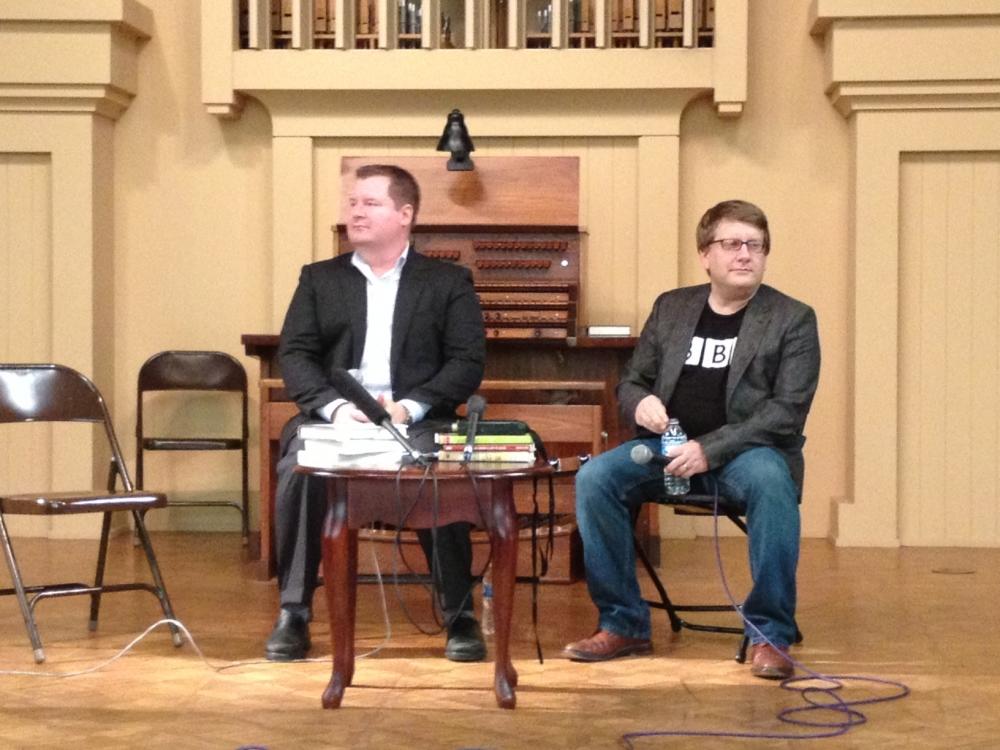
GHSA 6A Girls Basketball Championships: Grayson High School vs Newton High School starts at 5:30 p.m.
GHSA 6A Boys Basketball Championships: Wheeler High School vs Newton High School starts at 7:30 p.m.
Section Branding
Header Content
Objective Journalism In The Digital Age
Primary Content

Who's to blame for the fact that objective journalism, in the traditional sense of that term, is getting harder to find?
The news business, the Internet, the audience are all potential culprits named by panelists in a talk about objectivity in the digital age that I moderated at the Crossroads Writers Conference in Macon Saturday.
[Disclosure: My wife Lauren Morrill-Ragusea was a volunteer organizer of the conference.]
News audiences have become so cynical that they don’t believe objectivity is possible anymore, said Tim Regan-Porter, Director of Mercer University’s Center for Collaborative Journalism (in which GPB is a partner).
“I might as well just listen to Fox or MSNBC or whatever the news that fits my personal opinion is,” Regan-Porter said, channeling the mindset of the typical news consumer.
There are still a lot of journalists trying to play it down the middle, “but they’re not the ones gaining the traction,” said conservative commentator Erick Erickson. “They haven’t figured out how to make it profitable.”
Neither Erickson nor Regan-Porter consider themselves journalists.
Regan-Porter co-founded the music and entertainment magazine Paste before coming to Mercer where he now teaches journalism students. He considers himself more of a journalism scholar and entrepreneur than a practitioner. He is openly left-of-center.
Erickson says he does sometimes break news in his capacities as editor of RedState.com, talk show host on WSB radio in Atlanta, and Fox News contributor (formerly CNN), but he thinks of himself as being more generally “in media” than in journalism.
Nonetheless, both see what they consider a lamentable trend in which traditionally objective reporting is getting less popular, particularly in the digital space.
“Our politics are becoming increasingly non-productive because we live in echo chambers,” Regan-Porter said.
“The Web sites I read are the ones that lean center-right, typically,” Erickson said. “I’ve got a number of liberal friends who would say the exact opposite, and where we find the common ground becomes harder and harder because of it.”
As Erickson and Regan-Porter talked, a real world example unfolded around them. In an article for The Atlantic, James Fallows argued that objective journalists should not characterize the current federal government shutdown as resulting from a fight between Democrats and Republicans, but rather a fight between Tea Party Republicans and establishment Republicans.
“The fact is, [the budget impasse in Washington] is an inter-party issue, but it’s also an intra-party issue,” Erickson said in response to Fallows’ argument.
“A lot of the facts in politics are much more nebulous than people might think. And when there’s a call to say ‘X is X and X is a fact’ I think you begin to start shutting people out of the arguments,” Erickson said.
In the case of climate change, where the vast majority of scientists believe the climate is warming and humans are the cause, journalists still have a responsibility to represent the minority opinion, Erickson said. “On stories that continue to have a vocal controversy, I think you have to,” he said, acknowledging that he himself does not believe humans are altering the climate.
Journalists and journalism scholars — such as Fallows and New York University Professor Jay Rosen — who argue that objective journalists should be bolder about adjudicating controversial questions of fact are themselves generally left-of-center, Erickson said.
“I think the bias is not so much political as it is [in favor of] ratings,” Regan-Porter said. “The things that area dumbing [journalism] down are following web hits […] and trying to make link bait.”
"I would also blame the corporations that are […] less committed to a news division that is not driven by profits," Regan-Porter said, noting he was at the time wearing a BBC t-shirt. The BBC is funded largely by the British government through licensing fees, "which has its own problems," he added.
While both Regan-Porter and Erickson are dismayed by a trend they see toward oversimplification and sensationalization, they also agree that the rise of explicitly opinionated journalism is not necessarily a bad thing.
“I think journalists should acknowledge that they are not objective individuals,” Regan-Porter said. “If you’re raised in a more liberal tradition and have never had economics class with an Austrian professor, that’s a foreign world to you, and you’re never going to be straight down the middle. And so I think you need to acknowledge that and be transparent.”
Tags: journalism, Adam Ragusea, Center for Collaborative Journalism, erick erickson, Tim Regan-Porter, objectivity
Bottom Content
